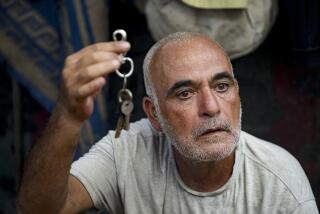Jewish Settlers in Gaza Strip Remove Star of David Badges
- Share via
JERUSALEM — Every Israeli schoolchild knows the significance of the yellow Star of David badges that the persecuted Jews of Europe were forced to wear in the dark days leading up to the Holocaust.
This week, Jewish settlers from the Gaza Strip sought to make this hauntingly evocative emblem -- colored orange instead of yellow -- a symbol of their struggle against Prime Minister Ariel Sharon’s plan to uproot their communities next year and hand over the area to the Palestinians.
Settlers and their supporters walked the halls of parliament with the badges pinned to their lapels. The nationally circulated Maariv newspaper carried a front-page picture of four settler children, the youngest a toddler with a pacifier, staring plaintively from behind a wire fence with the orange Star of David emblems affixed to their chests.
On Thursday, faced with an outpouring of revulsion and anger from across the Israeli political spectrum, Gaza settler leaders acknowledged that it might have been a mistake to try to appropriate an image of such iconic power in service of their cause.
“We had decided to wear an orange Star of David in protest of the prime minister’s plans to expel us from our homes,” Motti Sander, a leading activist from the main Gaza settlement block of Gush Katif, told Israel Radio. “But we are attentive to the feelings of the people of Israel ... and have therefore decided to stop this campaign.”
The Gaza activists’ capitulation came after leaders of the main Jewish settler group, the Yesha Council, moved late Wednesday to disassociate itself from the orange badge movement.
One prominent settler leader, Yehoshua Mor-Yosef, who until now has enthusiastically supported all protest measures employed by the Gaza activists, branded it an act of “craziness.”
Anger over the orange badges had been building since they were unveiled this week.
Former Justice Minister Tommy Lapid, a Holocaust survivor, condemned the badges as an ill-advised publicity stunt.
“To force a person to move his house is not putting him in a concentration camp, nor in a gas chamber, nor in the crematorium at Auschwitz,” Lapid said.
Even among the Gaza settlers’ supporters, the campaign stirred deep unease.
“My father lost his parents and his 11 brothers and sisters, so for me, the Holocaust is hallowed,” said Gila Finkelstein, a lawmaker from the pro-settler National Religious Party. “I say to my friends the settlers: I am with you in your struggle, but without Holocaust symbols.”
In some respects, the controversy was nothing new. The Gaza settlers and their supporters have for months invoked Holocaust imagery in pressing their cause, though usually less baldly than in this instance.
Nadia Matar, a settler activist, caused a stir this year when she wrote an open letter to Yonatan Bassi, the head of a new government agency created to oversee the evacuation of Gaza settlements. She likened Bassi, a religiously observant Jew, to a member of the Judenrat. Those Jewish councils were ordered by the Nazis to make lists that expedited the herding of Jews into ghettos, and eventually into death camps.
Settlers and their supporters commonly use language associated with Nazi-era decrees to characterize the planned evacuation of the 21 settlements in Gaza and four smaller ones in the West Bank, describing the relocations as the “forced transfer of Jews from their homes.”
The debate found its way into Israeli schools after some children turned up wearing the Star of David emblem. On Wednesday, the Education Ministry announced that the badges were banned in the classroom.
The Anti-Defamation League, a U.S.-based group that campaigns against anti-Semitism worldwide, called the campaign a misguided one.
Some of those who spearheaded the campaign said they had no regrets.
“I am 100% comfortable with what I did,” said Ron Bakshi, the Gaza settler who came up with the idea. “We received many supportive calls, including from Holocaust survivors.”
More to Read
Sign up for Essential California
The most important California stories and recommendations in your inbox every morning.
You may occasionally receive promotional content from the Los Angeles Times.










